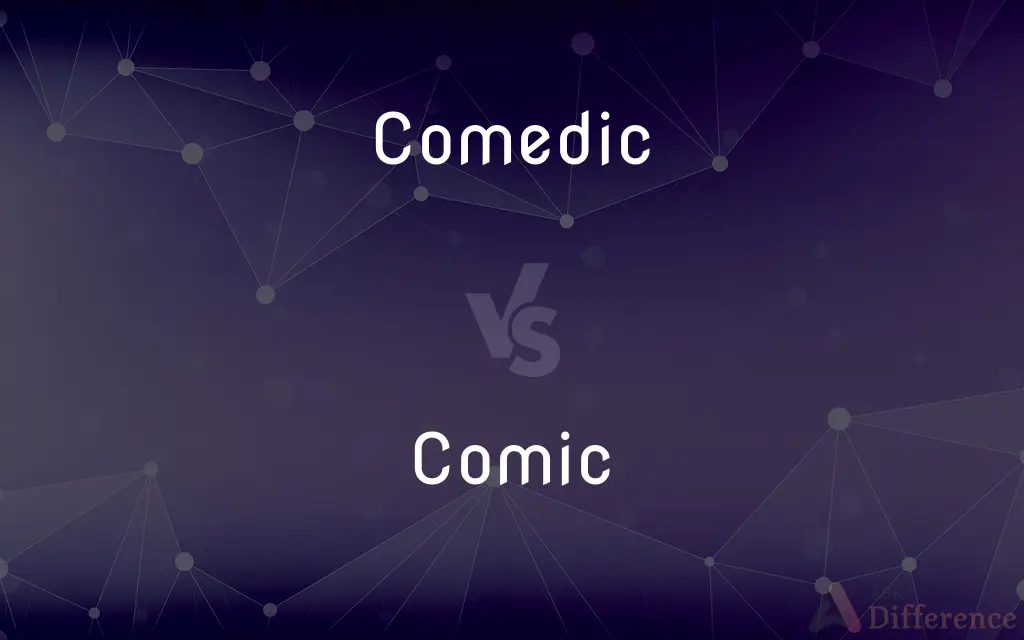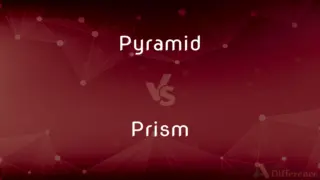Comedic vs. Comic — What's the Difference?
By Urooj Arif & Maham Liaqat — Updated on April 23, 2024
Comedic refers to elements related to the genre or style of comedy, emphasizing the creation and effect of humor, while comic pertains to anything amusing or humorous, often used in the context of comic strips or stand-up comedy.

Difference Between Comedic and Comic
Table of Contents
ADVERTISEMENT
Key Differences
Comedic is an adjective that describes something pertaining to or characteristic of comedy as a genre or style, focusing on the structures, techniques, and nuances that create humor. This term is often used in the context of films, literature, and performances where the intent is to evoke laughter or amusement through a deliberate comedic approach. On the other hand, comic serves as a broader descriptor for things that are amusing, funny, or designed to entertain through humor. It can be applied to a variety of mediums, including comic books, strips, stand-up comedy, and any content with humorous elements.
While both terms are related to humor, comedic often implies a more sophisticated or structured approach to creating laughter, involving timing, wit, and narrative devices. Comic, however, is more universally applicable and can describe anything from a simple joke to the art style of comic books that may not always aim for humor but often do. For instance, a comedic film is expected to follow certain storytelling principles to elicit laughter, whereas a comic strip might rely on visual gags or short, humorous exchanges.
The distinction also lies in their usage in various contexts. Comedic talent refers to individuals' ability to perform or write comedy, emphasizing their skill in crafting humor. Comic talent, while similar, could also refer to a person's natural ability to be funny, possibly without the structured format of a performance or written work.
Moreover, the term comedic has connotations of intentionality and craftsmanship in humor, suggesting a purposeful design to invoke laughter, often through observation, satire, or parody. Comic can denote a more spontaneous or natural quality of humor, found in everyday situations, dialogues, or characters, regardless of the medium.
While comedic and comic both relate to humor, comedic is more specifically tied to the art and craft of comedy as a genre, focusing on the deliberate creation of humor. Comic, however, is a broader term that captures anything with an amusing or humorous quality, including various forms of entertainment and expressions of humor.
ADVERTISEMENT
Comparison Chart
Definition
Pertaining to the art or genre of comedy
Relating to humor or designed to amuse
Context
Films, literature, performances with structured humor
Any amusing content, including comic strips and jokes
Connotation
Structured, sophisticated humor
Broad, often spontaneous humor
Focus
Techniques and structures of creating humor
Humorous content or character
Examples
Comedic film, comedic timing
Comic book, comic relief
Compare with Definitions
Comedic
Relating to or characteristic of comedy.
The play's comedic timing was impeccable.
Comic
Causing or meant to cause laughter; amusing.
The comic strip in the newspaper always brightens my day.
Comedic
Involving the creation or performance of comedy.
Her comedic approach to serious topics lightened the mood.
Comic
Associated with light-hearted or humorous content.
His comic observations of everyday life were hilariously accurate.
Comedic
Pertaining to the techniques used in comedy to evoke laughter.
The actor's comedic skills were on full display during the improv show.
Comic
Pertaining to stand-up comedy or comedians.
She attended a comic workshop to improve her stand-up routine.
Comedic
Referring to works or performances within the comedy genre.
The festival celebrated comedic talents from around the world.
Comic
Relating to comic books or comic strips.
He has an extensive collection of vintage comic books.
Comedic
Focused on the artistry behind humor and comedy.
The seminar explored the history of comedic cinema.
Comic
Used to describe a humorous aspect of something.
The comic relief in the drama series helped balance the tension.
Comedic
Relating to or characteristic of comedy; comic
With perfect comedic timing, he delivers the punch line
The man is a comedic genius
Comic
Causing or meant to cause laughter
A comic monologue
Comedic
Of or relating to comedy.
Comic
A comedian
He is training as a stand-up comic
Comedic
Relating to comedy.
Comic
A periodical containing comic strips, intended chiefly for children
The shop sold newspapers and children's comics
Comic
Characteristic of or having to do with comedy.
Comic
Of or relating to comic strips.
Comic
Amusing; humorous
A comic situation involving the family's pets.
Comic
A comedian.
Comic
A person whose behavior elicits laughter.
Comic
Comics Comic strips.
Comic
A comic book.
Comic
A source of humor in art or life.
Comic
Pertaining to comedy, as a literary genre.
Comic genius
A comic stereotype
Comic
Using the techniques of comedy, as a composition, performer etc; amusing, entertaining.
Comic
Unintentionally humorous; amusing, ridiculous.
Comic
A comedian.
She started out as a joke-writer on the radio, and first performed as a comic at the ages of 30.
Comic
A story composed of cartoon images arranged in sequence, usually with textual captions; a graphic novel.
Comic
(British) A children's magazine.
Comic
Relating to comedy, as distinct from tragedy.
I can not for the stage a drama lay,Tragic or comic, but thou writ'st the play.
Comic
Causing mirth; ludicrous.
Comic
A comedian.
Comic
A professional performer who tells jokes and performs comical acts
Comic
Arousing or provoking laughter;
An amusing film with a steady stream of pranks and pratfalls
An amusing fellow
A comic hat
A comical look of surprise
Funny stories that made everybody laugh
A very funny writer
It would have been laughable if it hadn't hurt so much
A mirthful experience
Risible courtroom antics
Comic
Of or relating to or characteristic of comedy;
Comic hero
Common Curiosities
How do you describe a person with a talent for humor?
A person with a natural ability to make others laugh can be described as having comic talent, while someone skilled in creating structured comedy might be noted for their comedic talent.
What makes something comedic rather than just comic?
Comedic specifically relates to the art and craft of comedy, focusing on structured techniques to elicit laughter, while comic is a broader term for anything humorous.
What’s the significance of comedic timing?
Comedic timing refers to the precise moment an action or line is delivered to maximize its humorous effect, a crucial aspect of performance in the comedy genre.
Can a movie be both comic and comedic?
Yes, a movie can be both comic and comedic if it contains humorous content (comic) and employs specific comedic techniques and structures to create humor.
Is a comic book always funny?
Not necessarily. While comic books often contain humor, the term also encompasses a wide range of genres, including drama and action, where humor may not be the primary focus.
What role do comedic elements play in non-comedy genres?
Comedic elements in non-comedy genres, such as dramas or thrillers, often serve to provide relief from tension, humanize characters, or add depth to the narrative, highlighting the versatility of comedic techniques beyond pure comedy settings.
Why is comic timing important in both comedic and comic performances?
Comic timing is crucial because it affects the audience's reaction to humor. In both comedic and comic performances, the precise moment a joke is delivered or a humorous situation occurs can significantly impact its effectiveness and the audience's response.
Can a work be considered comic without being intentionally funny?
Yes, a work can be considered comic if it inadvertently evokes laughter or amusement, even if it was not the creator's intention. The comic effect can arise from unexpected situations, character reactions, or the absurdity of circumstances.
Are there educational or therapeutic uses for comedic and comic content?
Yes, comedic and comic content can be used for educational purposes to engage and maintain interest, or therapeutically to relieve stress, improve mood, and foster a positive environment. Humor is a powerful tool for learning and healing.
What impact does audience expectation have on the success of comedic or comic content?
Audience expectation significantly impacts the success of comedic or comic content. Content that aligns with or cleverly subverts expectations can enhance enjoyment and appreciation, while content that falls short may not elicit the intended humorous response.
How does cultural context influence what is considered comedic or comic?
Cultural context greatly influences the perception of humor, as what is considered comedic or comic can vary widely across different societies. Jokes, tropes, and humorous expressions often rely on shared cultural knowledge or values to be understood and appreciated.
How do modern interpretations of classic comedic works adapt comic elements?
Modern interpretations of classic comedic works often adapt comic elements to contemporary sensibilities and humor, updating jokes, scenarios, and references to resonate with today's audiences while maintaining the original's spirit.
How do technological advancements influence comedic and comic expression?
Technological advancements expand the mediums and methods through which comedic and comic expression can be delivered, from digital platforms and social media to interactive and virtual reality experiences, broadening the reach and evolving the language of humor.
How do comedic actors differ from comic actors?
Comedic actors often specialize in performing in comedy genres, mastering the art of timing, expression, and delivery to evoke laughter through structured humor. Comic actors may also possess these skills, but the term can apply more broadly to any actor who excels in creating humorous characters or situations, regardless of the structured genre.
Can the terms comedic and comic be used interchangeably?
While the terms can sometimes be used interchangeably in casual conversation, they carry different nuances. "Comedic" more specifically refers to the art and craft of comedy, whereas "comic" broadly denotes anything humorous. The context and specificity of what is being described should guide their use.
Share Your Discovery

Previous Comparison
Pyramid vs. Prism
Next Comparison
Katakana vs. HiraganaAuthor Spotlight
Written by
Urooj ArifUrooj is a skilled content writer at Ask Difference, known for her exceptional ability to simplify complex topics into engaging and informative content. With a passion for research and a flair for clear, concise writing, she consistently delivers articles that resonate with our diverse audience.
Co-written by
Maham Liaqat















































